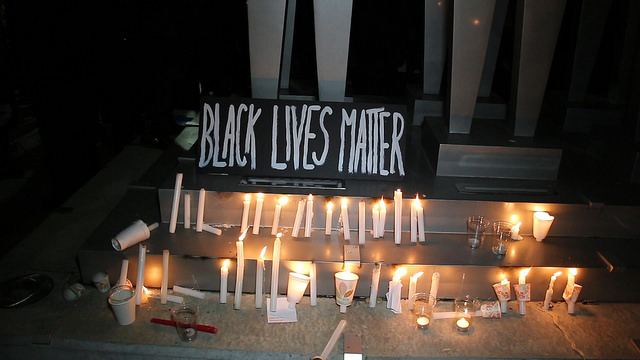Early in the new year, The Globe and Mail published an editorial listing the five conversations that Canada needs to have in 2015. It included a comment about needing to “lift up native Canadians, so the average aboriginal Canadian enjoys the same standard of living as the average Canadian.”
A timely inclusion in this (paradoxically racist) list would have been the view of racism and anti-Blackness as exceptional events in Canada, given our media’s readiness to comment on the violent and systematic racism in the United States. This, despite reports of racial profiling and discrimination faced by our sizable population of people of African descent, whether from the Diaspora or by way of immigration (racialization, notwithstanding).
One memorable account of racism focused on Canadian university campuses. University of York professor Frances Henry’s published a report in 2006 on Queens University’s “culture of whiteness,” which was summarily dismissed in an opinion piece by The Globe and Mail‘s Margaret Wente, who labelled the report, “rubbish,” and accused it of having a methodology that “would earn any serious sociology student an ‘F’.”
“I wouldn’t give any credibility to anything Wente writes,” said Frances Henry, who has since retired, but continues to conduct research.
Speaking about studies conducted with colleagues during the last four years, the preliminary findings of which were published in a special issue of the Journal of Canadian Ethnic Studies, on “Racialization, Race and the University,” Henry and her colleagues affirmed that the trend of Black underrepresentation continues, as does a lack of diversity, within larger urban Canadian university faculties.
According to their findings, these universities do not have a diverse faculty or staff at the senior managerial level or at the faculty level, and sustain a largely male and white representation.
“A large number of racialized faculty are basically satisfied with their roles and their positions, but a lot of them, at larger urban universities, have difficulty, and don’t feel any sense of inclusion. The younger members of faculty don’t receive enough significant mentorship in their career. In addition, what is most serious for most racialized faculty, is that a lot of them do research in areas that are meaningful to them, on race, but this kind of research is not really recognized as much as more mainstream research, so they have a hard time getting the perks that their research demands, such as research support, grants, etc. So this is a problem when they find that their work is not recognized, not through overt discrimination, but subtle underplay. I should say that this is not unusual to Canada, found in the U.S., and happens particularly to faculty of African descent. We are not alone.”
A few weeks ago, the United Nations proclaimed 2015 to 2024 the International Decade for People of African Descent. The present is the fourth of three decades dedicated to ending racism and racial discrimination, in acknowledgement that “their objectives are yet to be attained.”
In light of the UN’s International Decade, particular groups are moving to analyze its implication for Canada, including Nova Scotia’s provincial authority, the Office of African Nova Scotian Affairs (ANSA), which currently plans activities commemorating the province’s upcoming African Heritage Month.
“There are some similarities in that [Henry’s] particular analysis, to the Nova Scotian point of view; as you go up the echelons of the hierarchy, you will probably not find many [African Nova Scotians] who are holding on to decision-making positions,” said Wayn Hamilton, director of ANSA.
In a recent article for the CLR James Journal, “Shame: A Polemic,” Rinaldo Walcott, associate professor at the University of Toronto commented on “a long Canadian anti-Black history and a contemporary multicultural con-game,” speaking specifically about a policy of anti-Blackness on Canadian university campuses.
“By a long Canadian anti-Blackness and contemporary multicultural con-game, I mean that Canada’s normalized and popular history displaces and makes disappeared Black peoples’ presence in the place we have come to call Canada from before confederation,” said Walcott in an email.
“It also displaces the history of slavery in Canada and Canada’s colonial role in racial/Black slavery. Places like Nigger Rock in Quebec and Negro Creek in Ontario are then either not popularly known or are understood as anomalies. In my view such practices are anti-Black in that those practices work to make a Black presence non-consequential for the nation’s history. If those presences are addressed then we would have a different story of Canada and of Black people in Canada. Those practices are also anti-Black because contemporary multicultural rhetoric and policies then work to make it appear as if Black people only arrived here in the 1960s. That is the multicultural con game. What does multiculturalism have to say about black Nova Scotians?”
“We do feel that the history of Blacks in Nova Scotia is not widely known. It’s a little-known history. Recorded as some of the earliest Black settlements in Nova Scotia,” said Russell Grosse, executive director of the Black Cultural Centre for Nova Scotia, an organization that runs a museum and cultural community events.
“It’s like the best-kept secret. As a people, how can we expect Black Nova Scotians to progress when their history is not well-recognized? When you look at it from that perspective, there’s a lot at stake in preserving that history and culture.”
Valérie Bah is a freelance writer who divides her time between Kinshasa and Ottawa. Her writing and photos have appeared in Al Jazeera English, Radio Netherlands Worldwide (Waza), and Think Africa Press.
Photo: flickr/Rebel Sage




